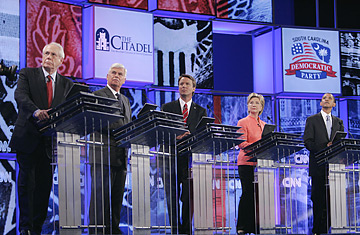
Democratic candidates for President at the Youtube debate in South Carolina.
The sequel to the self-styled "ground-breaking" YouTube debate on CNN may be history before it even begins.
The Rudy Giuliani campaign has cited scheduling conflicts in saying it will skip the Republican version of this week's Democratic debate, while Mitt Romney has mocked the seriousness of the questions and also seems likely to withdraw. John McCain, one of two candidates who had agreed to participate (Ron Paul is the other), has also expressed doubts about the Democratic debate's level of decorum and aides say he may reconsider his commitment. Undeclared candidate Fred Thompson may still not officially be in the race by the event's Sept. 17 airdate.
The Republicans' sudden aversion has political observers wondering whether abandoning an opportunity to participate in the fledging format shows a potentially costly reluctance to engage with voters or is simply an exercise in prudent message management.
CNN's YouTube debate with the Democratic candidates, heralded as an almost life-changing event for American voters, had its rough moments (the puppet snowman, the man with a gun for a baby), and even those on stage complained (Joe Biden referred to it at one point as a "ridiculous exercise"). But once the cameras were turned off, the event received warm reviews from most observers in the mainstream media. The Washington Post's Dan Balz called it "the best of the campaign season," the Chicago Tribune's blog said it was the "summer's best reality show," and the New York Times said that the viewer-submitted questions were able to elicit "points of difference on a broad range of issues, from whether the United States should build more nuclear power plants to whether it would be good policy — or even feasible — to withdraw American troops from Iraq within six months."
The view from the right was less favorable about the impact of this technological shift on politics. White House spokesman Tony Snow told reporters that the President had not even watched, saying Bush was "not big on YouTube debates." Hugh Hewitt, a popular right-wing blogger and radio talk show host, got more specific about what conservatives might object to in a CNN/YouTube debate — he alleged that CNN cherrypicked the submissions for biased questions that a "responsible" journalist wouldn't ask: "the CNN team used the device of the third-party video to inject a question that would have embarrassed any anchor posing it." One staffer for a Republican candidate now leaning toward not participating put it this way: "The problem isn't YouTube, it's CNN."
G.O.P. consultants and campaign staffers say that candidates' hesitancy about the debate stems from concerns similar to Hewitt's, rather than from any nervousness about the unpredictability of the format. What's more, says another G.O.P. operative, "Every day youre debating is a day youre not raising money." Adds the operative: "We've shown our willingness to take questions from real people. Look at the Politico debate" — in which questions submitted by e-mail were read. "And the game isn't over. There could be a online video debate somewhere, someday; it just doesn't look like this one will happen." The Florida debate was already on much shakier ground than the Democratic YouTube debate; the Democratic National Committee had put its seal on that debate, whereas the Republican National Committee has not endorsed this forum. It is co-sponsored by the Republican Party of Florida, which has insisted the show will go on.
The Florida party's optimism may lie in the hope that Governor Charlie Crist will use his influence to round up candidates. Crist has yet to endorse a anyone in his state's hugely important early primary — a mouth-watering carrot for any candidate willing to face the YouTube stick. But campaign staffers say that the prospect of a different G.O.P. debate in Florida — one sponsored by Fox — makes it unlikely that Crist will really turn on the heat.
Still, some Republicans worry that shying away from YouTube will make their candidates seem technophobic or out of touch. Patrick Ruffini, a G.O.P. online political strategist, wrote on his blog: "It's stuff like this that will set the G.O.P. back an election cycle or more on the Internet." Democratic consultants are rubbing their hands together at being able to portray their general election rivals as being — as one put it to me — "afraid of snowmen" or simply ignorant of techonologies that many Americans use on a daily basis. Indeed, Governor Romney today, in the context of evincing concern over Internet predators, supported that suspicion: "YouTube looked to see if they had any convicted sex offenders on their web site. They had 29,000," he said, mistaking the debate co-sponsor for the social network MySpace, which has recently done a purge of sex offenders from its rolls.
Ruffini has already started an online petition to encourage G.O.P. candidates to participate in the YouTube debate — savethedebate.com . One campaign staffer, however, contended that Ruffini is viewing the controversy through the "narrow vision" of an online consultant. The format, this staffer said, is only a problem insofar as it allows CNN to present questions that may be too aggressive or controversial for the confines of a standard campaign interaction. One might argue that this is the whole point of a YouTube debate — and that since the Democratic candidates have already dealt with them, why should the G.O.P. candidates be able to avoid snowmen and matrimony-seeking gay couples when their rivals couldn't?
If G.O.P. contenders succeed in making the case that technology is only incidental to their objections, they will have a precedent: The major Democratic candidates have pledged to boycott a debate sponsored by Fox News, citing the network's conservative bias as their reason. Right-wing commentators mocked the Democrats for their decision, but the netroots applauded. And whether Republicans can make the case to a general audience that CNN is biased to the left hardly matters — their base voters likely already believe it.
